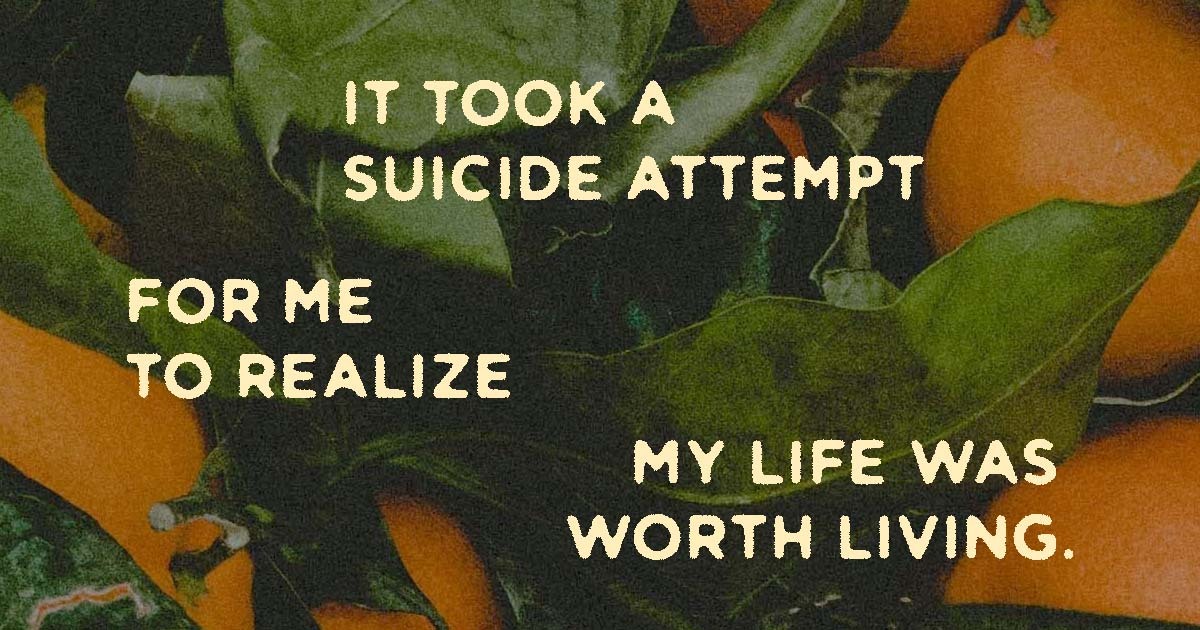Note: This piece talks about suicide ideation and a suicide attempt. Please use your discretion.
I remember the first time I considered killing myself. I was in sixth grade, and I wondered about vague and various ways to end my life. These were clearly the dark musings of a 12-year-old, and (thankfully) not very planned out. I never went past fleeting thoughts, but the seed was planted. A small part of me hated myself enough to consider dying.
Genuine suicidality hit when I was around the age of 20. I was seeing a therapist, and yet, despite her best efforts, I still sank into a mote of depression. Sitting in my car in the parking garage at school, I wondered what it would be like to end my life. My whole body went numb at the thought. This time it was different because I was hit with the realization that I really could do it, and, what’s more, was considering doing it. I was terrified of my own mind.
I didn’t really want to die. I just wanted the pain to stop. That seemed like the only way.
Five years later I attempted suicide and it landed me in the hospital. I kept telling the staff in the ER that I just needed my “brain to chill.” The buzzing inside was so loud. It was chaos. The pain was excruciating.
What led to this? To this recurrent theme of suicidality in my life, beginning at the ripe age of 12?
Self-hatred. I hated myself.
Anxiety. Everything made me anxious.
Shame. I was convinced something must be wrong with me. There was no possible way I was normal. Something in me was innately wrong. I was sure of it.
The pain came in varying waves, bringing me to my knees or knocking me down completely. It was hard to stand beneath the weight of it. I leaned into self-help and began attending therapy, certain that with the right formula, I would get better. And I did, for a while. Between the severe bouts of darkness were periods of calm. It imitated the way the world becomes still before a tornado; these periods of calm would often predate an internal catastrophe. After a few months of relative stability, something would set me off and I would spiral into self-loathing and shame. It was a vicious cycle, and one I saw no way out of.

It wasn’t until after my hospitalization that I began to receive the therapy I needed. I attended intensive outpatient therapy, going for hours every day to learn skills from dialectical behavior therapy and to participate in a process group. Intensive outpatient gave me a foundation of crisis-intervention skills I needed before beginning more traditional one-on-one talk therapy.
We learned about opposite action, where you choose an alternative action to whatever your emotions are pushing you to do. For example, if you feel the urge to self-harm, the opposite action would be choosing not to self-harm and instead dunking your head in cold water to level out your nervous system. I also met other people who had been through similar seasons of extreme depression and anxiety. This gave me hope.
If they could heal, I could heal, too.
I lived for years inside my own personal nightmare. It was difficult to wake up in the morning, or better yet, take on the day. Somehow, I made it. I now live a fulfilling life surrounded by people who know and love me, safe with my dog in a cozy apartment. I love and find purpose in the existence I have built. The reason I tell you this is so that you know there is hope. If someone like me, who felt so innately wrong she didn’t even think she deserved to continue to keep living can make it, so can you.
It took a suicide attempt for me to realize my life was worth living. I don’t want that to be you. Seek help now and build the life you deserve. You are worth it.
In partnership with Move Into Light, an initiative of Brevard Prevention Coalition, and sponsored in part by Central Florida Cares Health System, Inc. and the State of Florida, Department of Children and Families.
Whatever you are facing, there is always hope. And we will hold on to hope until you’re able to grasp it yourself. If you’re thinking about suicide, we encourage you to use TWLOHA’s FIND HELP Tool to locate professional help and to read more stories like this one here. If you reside outside of the US, please browse our growing International Resources database. You can also text TWLOHA to 741741 to be connected for free, 24/7 to a trained Crisis Text Line counselor.
Emily
I feel exactly like this and im 13
troilynn samson
thank you for your story.